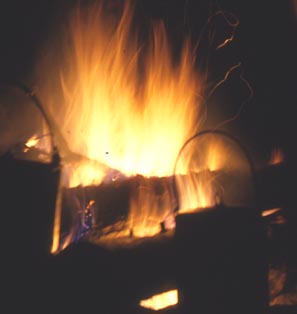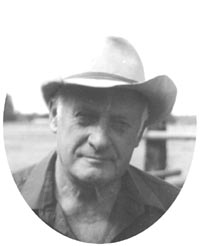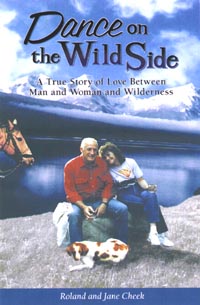a weblog sharing info on outdoor skills and campfire musing by a guy who spends a bunch of time in pursuit of both
CULTURE
WHERE -
TALES ARE TOLD OF
Welcome to Roland Cheek's Weblog
Roland is a gifted writer with a knack for clarifying reality. Looking forward to more of his wisdom
- Carl Hanner e-mail
It strikes me that sharing with others is a high calling, perhaps the highest of all beckonings from the Gods. I'm sure church ministry is an example of that sharing; but I'm not sure that ministers are any more called of God than parents. Or teachers. Or maybe even writers. The bottom line is whether they share their knowledge in such way to help others find their way through the shoals of life. It is my intent for this Campfire Culture weblog to share some of those values and campfire meditations an active outdoor's life has provided. Let us know through the feedback section if I'm succeeding. Please.
To access Roland's weblog and columns archives
Tip o' the Day
It has come to my attention (rather late in life I might add) that the most valuable commodity available to humans is information. And my limited observation tells me that's also true for most of what we consider the "higher order" of animals. Else why would bears return to the same meadows and swamps that contain the same succulent grasses and forbs in the spring? Or why would they return to the same high alpine basins where cutworm moth migrations can be found feeding on wildflower nectar in midsummer?
Elk, I've observed, learn through experience when bluebunch wheatgrass turns tasty when it does, and where best it can be found. They've discovered the best migration routes, and how they can be altered depending on weather conditions.
We humans spend a great deal of time researching information: the price of wheat futures, developing uses for plastics, and frantically searching for cures for multiplying diseases. I put much of my life into studying how a horse or a dog thinks. Dogs are easy, horses tougher.
I learned a bunch from Larry. He was a guy who cane to his maturity working around horses and mules used in the U.S. Forest Service. His mentors were the old horse and mule men from pre-World War II days. They taught Larry that it was useless to beat a stubborn mule with a stick, and Larry taught me. And he taught me the most important piece of information of all: that the way to get the best from your ponies is to get inside their heads and make them think they really want to do this thing you want them to do.
"Get inside their head," Larry said. "Find out what they're thinking, then shape that thinking until you're working as a team."
It's a good plan. A working horse has to work, just like a working man or woman. But he, like they, needn't be beaten or starved or abused. If you can share with them what's expected, maybe slip them a handful of oats as a treat, water them along the trail, and adjust their packs when they slip off center, that pony will do its best for you.
And here's another secret: their best is more than good enough -- maybe even better than yours!
Ethan Lester, the 13-year-old California lad turned into quite an email correspondent because he likes my Western novels wrote that he was grounded "again" -- which gave me a chance to share a little insight:
"Grounded, huh? Having been a teenage boy myself, and having raised a teenage boy and a teenage girl, I understand how such things happen -- though I'll never stoop so far as condoning the actions leading to it. At least your computer privileges weren'e taken from you, and that's something. Mine weren't either, but, then, computers had yet to be invented back in the stone age when I was a teenage guy.
"Incidentally, my teenage boy wasn't that much of a problem, and therefore wasn't grounded as often as his sister. The reason for it might've been because he was so interested in outdoors adventure that he spent most of his free time amid the wilds, as opposed to finding misadventures downtown. There are seven stories about some of his adventures in my book about elk, The Phatom Ghost of Harriet Lou. He's presented in that book as being my grandson, but those seven stories scattered throughout that book is actually about our son, Marc, and his father (me). The first of those stories is the first chapter of that elk book -- which means you can also read that on my website.
"Now back to the grounding: I don't know why you were grounded, nor do I care. Just do your penance like a responsible guy should, then you'll be ungrounded. At that time, you should examine why you were grounded, and decide whether it was really worth it. Doing the right thing isn't a matter of whether or not you get caught, but a matter of living with yourself after doing the thing that caused your grounding. And yeah, I've done a thing or two during my life that I'm not so proud of. But I took my punishment like a man should and tried to do better next time -- not because I was afraid of punishment, but because there are right things to do and wrong things to do. Spending time on penance left me plenty of time to cogitate on which was which.
"Okay, you didn't ask for this, but I like you, so what the heck?"
HOT WEATHER HEATHENS
Rain had been drumming down for hours, even on this mid-summer day. The computer hummed to life while I slid into the swivel chair, spat into my hands, and prepared to do battle with yet another weblog. What's needed is an upbeat story of real-life adventure, one that's inspirational. But staring out the window, all I'm getting are recollections of riding through drenching rain and mind-numbing mud.
Are memories often triggered by one's present visible environment? After all, we should be in the dog days of mid-summer. By the time most folks read this blog, especially so throughout most of middle America, thermometers will have taken massive tomato juice transfusions. Think hot, Roland. Drudge up memories of ye olde swimming holes of your youth, of a bunch of gangly boys stripping off and plunging in and spitting mouthfuls of muddy water in a spewing stream--and fantasizing about a troop of Girl Scouts peering from streamside bushes.
Or consider more recent Rocky Mountain highs during blistering weather--like the time four of us packed in for three days at the upper end of Glacier Park's Harrison Lake....
There's only the one trail into Harrison, and that is impassable for horses beyond the lake's inlet. In addition, ancient forests shroud the surrounding mountains, affording no real opportunity to scramble-climb for a view. Without much else to do, Harrison Lake is the kind of place where one is compelled to either fish or sleep. We did both for a day or two--until our horses decided they knew of more lush pastures and started home.
By great good luck, three of us without horses was accompanied by one guy smart enough to keep his pony tied to the Park's patrol cabin's hitchrack. I tried to squeeze in a little more shuteye, but the nagging thought about being stranded in one of the more remote parts of Glacier National Park popped the eyeballs open from time to time. Fortunately, our friend trailied our loose and ponies back to camp in mid-afternoon.
Two of our group decided to get in a little late afternoon fishing, while Bill and I, tired of fishing, opted to fight mosquitos and horseflies, wipe sweat, and commune with our errant horses. Naturally my brown-eyed palomino looked suitably penitent as I berated him and fed him half of my apple.
Still opting not to fish, and with little else to do but pour sweat in 90-degree shade, Bill and I led our barebacked saddlehorses to the lake to drink. The ponies also wet with sweat, waded out into the lake to their bellies, then began pawing and splashing water clear to their withers.
"Looks like fun," I murmured.
Bill was already stripping off his clothes. I followed his example and soon we were astride my palomino and his tiger-striped buckskin, riding barebacked and bare-bottomed, swimming the horses out into the lake, slipping from their backs, each to hold his pony's tail as the animal turned for shore. Again and again.
At first our two buddies were angered at our encroachment on their fishing grounds, but they soon dropped their flyrods and ran for their own horses.
Actually the water was frigid cold, but our wild cavorting, standing atop our swimming horses, splashing and water fighting and laughing and shouting kept us warm until exhaustion took over. Then we drip-dried while lying on lakeshore stones amid the blazing sun and talked about how we didn't really care whether Kruschev thumped his shoe in a United Nations' debate, or the what price pork futures on the Chicago exchange. The mill where three of us worked seemed a remote place and our evening cocktail hour was not in the least foreshortened because we never got around to beginning it until the sun sank behind mountains to the west.
The entire group's euphoria was still in bloom when, the following day, we reluctantly started homeward. And that euphoria remains almost five decades later when two of us might yet meet. Bill is, unfortunately beset by Alzheimers, but the last time we were together he still remembered how I poked the rear-end of his plodding saddlehorse with a small lodgepole and he thought the lazy horse was being beset by horseflies.
Then he grinned hugely and said, "Remember how we swam our horses out in that lake--which one was it?"
"Harrison. And it was really hot. And we stripped down to our uh-huhs and cavorted in the lake."
Bill was chuckling. "Was that the same time you kept wishing for a Girl Scout troop to go hiking by?"
Roland Cheek wrote a syndicated outdoors column (Wild Trails and Tall Tales) for 21 years. The column was carried in 17 daily and weekly newspapers in two states. In addition, he scripted and broadcast a daily radio show (Trails to Outdoor Adventure) that aired on 75 stations from the Atlantic seaboard to the Pacific Ocean. He's also written upwards of 200 magazine articles and 12 fiction and nonfiction books. For more on Roland, visit:
www.rolandcheek.com
Recent Weblogs
Tuesday July 29, 2008
for more info about these and other Roland Cheek books
Book containing the seven chapters with the grandpa's and the kid's annual wilderness hunting trip
There's a bunch of specific info about Roland's books, columns, and archives. By clicking on the button to the left, one can see Roland's synopsis of each book, read reviews, and even access the first chapter of each of his titles. With Roland's books, there's no reason to buy a "pig in a poke."
for detailed info about each of Roland's books
Read Reviews
Read their first chapters
For interested educators, this weblog is especially applicable for use in wildlife and environmental classes, as well as for journalism students.
Roland, of course, visits schools. For more information on his program alternatives, go to:
Dance On the Wild Side and Montana's Bob Marshall Wilderness
two other books set amid wilderness adventure; one the story of Jane's and Roland's life; the second an 80 page 9 X 12 coffee table book with 100 full-color photos
NEXT WEEK:
ABOUT NETTLES AND MOUNTAIN VIEWS
www.campfireculture.com
Roland's My Best Work is Done at the Office shares many stories about horses and their antics amid the wild Rockies. In fact, the author, in the foreword says his objective in the book's beginning was to ". . . afford six plough horses and a Labrador retriever. We're down now to four aging ponies and one photograph of the greatest dog who ever lived -- the task of turning dream to reality is illusve and requires modifcation."
to visit Roland's newspaper columns and weblog archives
source links for additional info
to send this weblog to a friend
to tell Roland what you think of his Campfire Culture weblog






